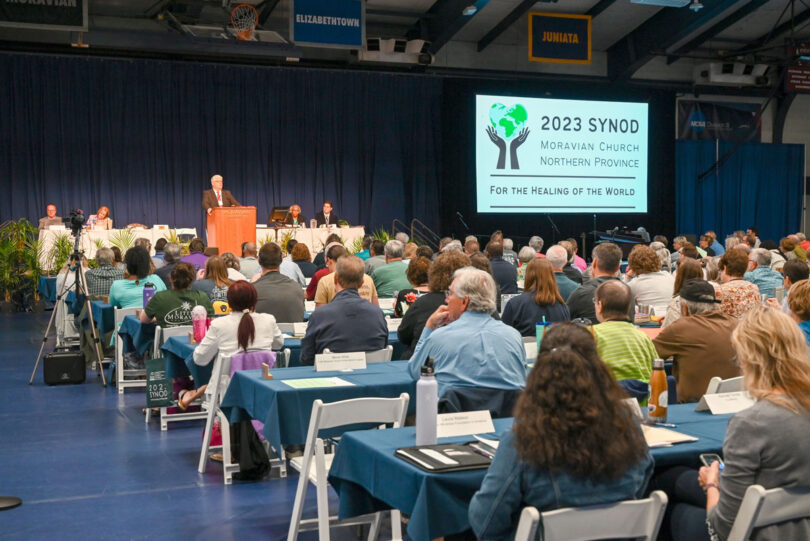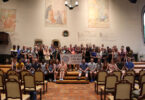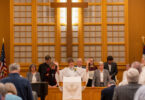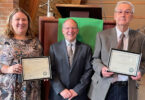During four days in June, Moravians from across the Northern Province came together to discern a vision for the future and legislate on actions that help that future vision become a reality.
The 2023 Synod, held June 22-25, brought delegates from all Northern Province congregations to Moravian University in Bethlehem, Pa., to consider a broad range of resolutions that provide direction, state church positions and recommend actions for the province for the coming three years.
Provincial synods are the highest judicatory in the province, with supreme legislative power in all matters not committed to the Unity Synod. In other words, synods are where decisions about the church, its direction, its response to issues and plans for the future are set in motion. During synod, it represents the leadership of the church. The Provincial Elders’ Conference, members of which are elected at synod, implement the directives of synod and manage the province in the period between synods.
The 2023 Synod marks the end of a long tradition in the province—the chairmanship of Rick Santee, provincial chancellor. Since 1992, Rick has overseen the running of synod (and many district synods in between). This was his last Synod for the Northern Province.
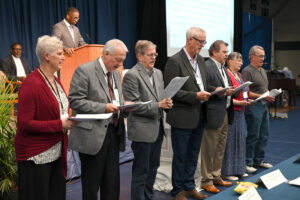 Electing leadership and bishops
Electing leadership and bishops
One of the key responsibilities of the provincial synod is the election of church leadership. The main election is for Provincial Elders’ Conference (PEC) president and lay members of the PEC.
The Rev. David Bennett, who was serving as chaplain at Morningstar Senior Living in Nazareth, Pa., was elected PEC president. Dave is a former president of the Eastern District Executive Board.
Ralph Wanamaker, Jr. and Susan Dreydoppel were re-elected to the PEC, while Ruth Ricketts of John Hus Moravian Church in New York and Keith Gohdes of Goshen Moravian Church in North Dakota were newly elected. (For more detail, see story on page 18.)
In addition to the PEC, members for the boards of other church agencies and ministries were elected during this synod. Many of the elections and votes on resolutions were handled using electronic voting systems for the first time, speeding the process and providing instant results.
Synod also elected two new bishops in the Northern Province. The Rev. Dr. Amy Gohdes-Luhman (Waconia Moravian Church in Minnesota) and the Rev. Dr. Michael Johnson, (John Hus Moravian Church, Brooklyn, N.Y.) were elected to serve as bishops of the Moravian Unity. Unlike many other denominations, Moravian bishops hold no administrative role; instead, they serve as “pastors to pastors” and provide spiritual leadership and guidance to the church as a whole.
Passing resolutions
Over the course of four days, synod delegates took up nearly 75 resolutions and reports on a broad range of topics. A complete listing of the Synod resolutions is available on Moravian.org/northern.
The Synod of 2023 addressed a number of areas dealing with clergy and pastoral care by passing resolutions to establish a bereavement leave policy for pastors, provide resources to equip clergy to thrive in ministry, and enhance the deacon supervision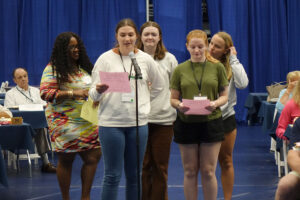 program. Synod also encouraged continued churchwide efforts to develop and empower lay leadership in congregational ministry.
program. Synod also encouraged continued churchwide efforts to develop and empower lay leadership in congregational ministry.
Synod also addressed emerging ministries as an important part of the church’s future. Delegates approved the establishment of a coordinator of Emerging Ministries and New Faith Communities position within the province and called on the PEC to develop a “try emerging ministries” internship program to connect those interested in new expressions of church with existing ministries.
On the healthier congregations front, Synod called for creation and sharing of training materials for gender inclusion and making accessibility in our congregations and church buildings a priority.
Recognizing the ongoing importance of youth leadership in the church, synod voted to establish a Provincial Youth Council, encourage greater participation of youth in all levels of church leadership, and invite three youth delegates, each with full voice and voting responsibilities, to future Northern Province synods.
Governance and finance
A traditional role of synod is to legislate on the governance of the church. In 2023, the Synod approved changes in voting privileges at synod for certain interprovincial ministry leaders and youth delegates. Synod also charged the incoming PEC with analyzing statistics to ensure appropriate representation of clergy and lay delegates at future synods, while bringing a number of resolutions to update the Book of Order to reflect changes in church structure over the past five years.
Synod also had the opportunity to review, comment upon and ultimately pass the provincial budget for the coming year. This part of Synod gave delegates a closer look at the province’s financial picture, providing guidance for the budgets that will come during the period between synods.
Relations with others
The Synod of 2023 considered and approved expanding relationships with denominations and organizations outside the Moravian Church. It called for expanding the relationship between the Northern Province and Churches for Middle East Peace; highlighted the growing connection with the United Church of Los Alamos, which claims the Moravian Church as one of its founding denominations (see story in Issue 1) and approved the beginning of a dialogue with the Christian Methodist Episcopal Church.
Synod also approved a full communion relationship between the Moravian Church, Northern Province, and the Evangelical Lutheran Church in Canada and the Anglican Church of Canada. This full communion was approved by the ELCIC and Anglican Church a few weeks later at their combined assembly.
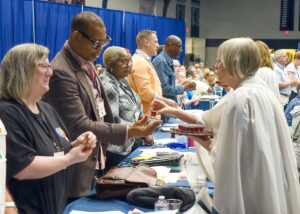 Stating provincial positions
Stating provincial positions
Church and Society topics were a central part of this year’s synod. A wide range of resolutions reflecting and declaring the church’s position on racial justice, relations with Indigenous peoples, inclusivity and other topics were discerned, discussed and voted upon.
Several of the resolutions dealt with ongoing efforts to address racial justice and healing. In addition to recognizing the work of the province’s Racial Justice Team to raise awareness and provide opportunities to address issues of race, the synod reaffirmed a 1917 call for justice by the Rev. Charles Martin; called for advocacy on mass incarceration and legal system reform; and stated support for combatting anti-Semitism, white supremacy and Christian Nationalism.
Synod resolutions passed also called for action and education on: mental health issues in our communities; repudiation of the Doctrine of Discovery and promoting efforts for reconciliation and healing with indigenous peoples; LGBTQIA+ justice and healing within the church; an end to gun violence; and humane treatment and support for those crossing our borders.
Action on these issues will be covered in greater detail in future issues of the Moravian. The complete resolutions, including background documentation and resources to help congregations and members address this work, are available on the Northern Province website.
Fellowship, worship and fun
Synods offer a rare opportunity to bring together Moravians from all corners of the Northern Province. During the four days of Synod, Moravians had opportunities to meet, worship with and re-connect with Moravians from many walks of life.
Synod is also an opportunity for delegates to hear reports from leaders of church ministries and agencies like Moravian Theological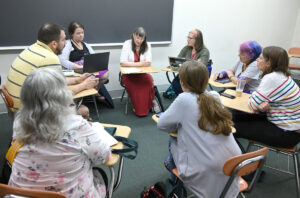 Seminary, the Board of World Mission, the Northern Province Archives, Moravian Ministries Foundation in America and others. Each of these agencies also provide reports to Synod, outlining their work over the past intersynodal period.
Seminary, the Board of World Mission, the Northern Province Archives, Moravian Ministries Foundation in America and others. Each of these agencies also provide reports to Synod, outlining their work over the past intersynodal period.
Synod also received greetings from Ecumenical partner leaders, including the Rev. Elizabeth Eaton, presiding Bishop of the Evangelical Lutheran Church in America, and representatives from the Episcopal Church, United Methodist Church and the United Church of Los Alamos.
The 2023 Synod featured a keynote address by the Rev. Dr. Frank Crouch, former dean of Moravian Theological Seminary, who presented on the Moravian Church’s history with enslaved persons and racial justice issues during its history in America.
And as is tradition, the Rev. Dr. Betsy Miller, outgoing president of the Northern Province Provincial Elders’ Conference, delivered a “State of The Church” address. This talk outlined the successes, challenges and hopes for the province. A recording of her address is available online. Synod recognized the work of Betsy, who is retiring after 13 years as PEC president, with remembrances, a slide show and gifts of appreciation.
This synod was initially to be held in 2022, but due to cautions about COVID-19, the event was postponed to this year. The next synod, which typically occur every four years, will return to its normally-scheduled date in 2026.
Photos by Mike Riess and Kat Lehman

